- Home
- Ian McDonald
Cyberabad Days Page 30
Cyberabad Days Read online
Page 30
That would have been enough to end our hopes that this twentieth-first century would be a smooth and lucrative extension of its predecessor. But their plans were not conflict or the subjugation of humanity. That would have meant nothing to the aeais, it was a human concept born of a human need. They inhabited a separate ecological niche and could have endured indefinitely, caught up in whatever concerns were of value to distributed intelligences. Humanity would not let them live. The Krishna Cops were cosmetic, costume cops to maintain an illusion that humanity was on the case, but they did signal intent. Humans would admit no rivals, so the Trimurti of Generation Three engineered an escape from this world, from this universe. I did not understand the physics involved from Shiv’s description; neither, despite his pedantic, lecturing IT-boy tone, did he. I would look it up later, it would not be beyond me. What I did glean was that it was related to that mirrored crater on the university campus that looked so like a fine piece of modern sculpture, or an ancient astronomical instrument like the gnomons and marble bowls of Delhi’s ancient Jantar Mantar observatory. That hemisphere, and an object out in space. Oh yes, those rumours were real. Oh yes, the Americans had discovered it long ago and tried to keep it secret, and were still trying, and, oh yes, failing.
‘And what is it then?’
‘The collected wisdom of the aeais. A true universal computer. They sent it through from their universe.’
‘Why?’
‘Do you never give presents to your parents?’
‘You’re privileged to know this information?’
‘I have channels that even the government of Awadh doesn’t. Or, for that matter, the Americans. Odeco . . .’
‘Odeco you said was an avatar of the Brahma aeai. Wait.’ Had I balls, they would have contracted cold and hard. ‘There is absolutely nothing to prevent this happening again.’
‘None,’ said Shiv. It was some time since he had laughed his vile, superior laugh.
‘It’s already happening.’ And we thought we had won a water war.
‘There’s a bigger plan. Escape, exile, partition is never a good solution. Look at us in Mother India. You work in politics, you understand the need for a settlement.’ Shiv turned in his chair to the figures on the verandah. His wife was still watching me. ‘Nirupa, darling. Come over here, would you? Uncle Vish hasn’t had a chance to meet you properly.’
She came dashing down the steps and across the lawn, holding up the hem of her print dress, in a headlong, heedless flight that made me at once fearful for stones, snakes and stumble and at the same time reminded so much of my golden years growing up alongside Sarasvati. She put her fingers in her mouth and pressed close to her father, shy of looking at me directly.
‘Show him your bindi, go on, it’s lovely.’
I had noticed the red mark on her forehead, larger than customary, and the wrong colour. I bent forward across the table to examine it. It was moving. The red spot seemed to crawl with insect-movement, on the edge of visibility. I reeled back into my chair. My feet swung, not touching the ground.
‘What have you done?’ I cried. My voice was small and shrill.
‘Shh. You’ll scare her. Go on; run on, Nirupa. Thank you. I’ve made her for the future. Like our parents made you for the future. But it’s not going to be the future they thought.’
‘Your biochip interface.’
‘Works. Thanks to a little help from the aeais. But like I said, that’s only part of it. A tiny part of it. We have a project in development; that’s the real revolution. That’s the real sound of the future arriving.’
‘Tell me what it is.’
‘Distributed dust-processing.’
‘Explain.’
Shiv did. It was nothing less than the transformation of computing. His researchers were shrinking computers, smaller and smaller, from grain of rice to sperm cell, down down to the molecular scale and beyond. The endpoint was swarm-computers the size of dust particles, communicating with each other in free-flying flocks, computers that could permeate every cell of the human body. They would be as universal and ubiquitous as dust. I began to be afraid and cold in that clammy Varanasi night. I could see Shiv’s vision for our future, perhaps further than he could. The bindi and the dust-processor: one broke the prison of the skull; the other turned the world into memory.
Little by little our selves would seep into the dust-laden world; we would become clouds, non-localised, we would penetrate each other more intimately and powerfully than any tantric temple carving. Inner and outer worlds would merge. We could be many things, many lives at one time. We could copy ourselves endlessly. We would merge with the aeais and become one. This was their settlement, their peace. We would become one species, post-human, post-aeai.
‘You’re years away from this.’ I denied Shiv’s fantasia shrilly.
‘Yes, we would be, if we hadn’t had a little help.’
‘How?’ I cried again. Now the ayah was staring concerned at me.
Shiv pointed a finger to the night sky.
‘I could report you,’ I said. ‘Americans don’t take kindly to having their security hacked.’
‘You can’t stop it,’ Shiv said. ‘Vish, you’re not the future any more.’
Those words, of all that Shiv spoke in the garden, clung to me. Gliding silently through Delhi in the smooth-running black government car, the men in their white shirts, the women in their coloured shoes, the cars and the buzzing phatphats seemed insubstantial. The city was still thrilled with its brilliant victory - only a drubbing in cricket would have exercised public excitement more - but the crowds seemed staged, like extras, and the lights and streets as false as a set on Town and Country. How would we survive without our national panacea? But Shiv had confirmed, there was nothing, absolutely nothing to prevent a new generation of Threes from arising. They could already be stirring into sentience, like my divine namesake on his scared turtle Kurma churning the sacred milk into creation. I was acutely aware of the clouds of aeais all around me, penetrating and interpenetrating, layer upon layer, level upon level, many and one. There was no place in the two Delhis for the ancient djinns. The aeais had displaced them. This was their city. Settlement was the only answer. Dust blew through the streets, dust upon dust. I had seen the end of history and still my feet did not touch the floor of the limo.
I was obsolete. All the talents and skills Mamaji and Dadaji had gifted me were nothing in a world where everyone was connected, where everyone could access the full power of a universal computer, where personality could be as malleable and fluid as water. Slowly slowly I would grow up through adolescence to maturity and old age while around me this new society, this new humanity, would evolve at an ever-increasing rate. I was all too aware of my choice. Take Shiv’s way and deny everything I had been made for, or reject it and grow old with my kind. We, the genetically enhanced Brahmins, were the last humans. Then, with a physical force that made me spasm on the back seat of the limo, I realised my hubris. I was such an aristocrat. The poor. The poor would be with us. India’s brilliant middle class, its genius and its curse, would act as it always had, in its unenlightened self-interest. Anything that would give advantage to its sons and daughters in the Darwinian struggle for success. The poor would look on, as disenfranchised from that post-human world as they were from this fantasy of glass and neon.
I was glad, glad to tears, that I had chosen to pass nothing on into this future. No endless chain of slow-aging, genetically obsolete Brahmins hauling themselves into an increasing unrecognisable and inhuman future. Had I received some premonition? Had my uniquely overlapping senses seen a pattern there all those years ago that even Shiv, with his clandestine access to the collected knowledge of the Generation Threes, had not? I wept unreservedly and ecstatically in the back of the smooth-running car. It was time. As we turned into the down ramp to the underground car park at Ramachandra Tower, I made three calls. First I called Prime Minister Srivastava and tendered my resignation. Then I called Lakshmi,
patient Lakshmi who had through our charade of a marriage and sterility become a dear and intimate friend, and said, Now, now’s the time for that divorce. Last of all I called my mother on the floor above and told her exactly what I had done with myself.
A father festooned with memory
Wait! One more trick. You’ll like this trick, the best trick of all. You haven’t seen anything yet, just a bit of running in circles and jumping through hoops. Yes, I know it’s very very late and the sun will soon be up the sky and you have cows to milk and fields to tend to and appointments to keep but you will like this trick. Not a lot, but you will like it. Now, two ticks while I fix up this wire.
And anyway, I haven’t finished my story. Oh no no, not by a long chalk. You thought it ended there? With the world as you see it, now you know how intimately I am involved in our history? No, it must end well, a well-made story. I must confront the villain, according to the theories on such things. There must be resolution and an appropriate moral sentiment. Then you will be satisfied.
The wire? Oh, they can walk that. Oh yes, those cats. No no no; first you must listen a little longer.
I walked away. We have a great and grand tradition of it in this great teat of divine milk hanging from the belly of Asia. Our country is big enough to swallow any soul, our orders still porous to pilgrims with a stick and a dhoti wrapped around their loins. Our society has a mechanism for disappearing completely. Anyone can walk away from the mundane world into the divine. Mine was not the orthodox spiritual path and not conventionally divine. I had seen the coming gods. I set aside my career, my clothes, my apartment, my wife - with her blessing and a farewell kiss - my family and friends, my identity, my social networks, my online presence, everything but my genetic inheritance which could not be undone and turned sadhu. Only Sarasvati knew my secret com address. I was gone from the apartment, beating through the neon-lit heat of Rajiv Circle, out along the sides of expressways, drenched in yellow light, beneath the back-throttle of aircraft coming in to the airport, past the brick and cardboard and plastic shelters of the invisible poor. Dawn saw me among the ribbed aluminium flanks of the go-downs and factories of Tughluk. I crossed a city on foot in a single night. It’s a great and strange thing to do. Everyone should do it. I walked along the cracked concrete spans of expressways, by the sides of country roads blasted by the grit and gust of passing trucks, along the side of the huge slow trains materialising like visions out of the heat haze, the drivers flinging me rupees for blessings as they passed. I sat down and covered my head and eyes as the high-speed shatabdi express blasted past at hundreds of kilometres per hour. Did the passengers even glance at me through the darkened glass? If so I must have seemed a very strange sadhu to them. The littlest sadhu. Small but determined, beating forward with my staff at every stride.
What was I doing? Walking. What did I hope to find? Nothing. Where was I going? To see. Don’t think me a coward or a failure, that I was walking away from truths I could not admit. I had been stabbed to the bone by the revelation that I was irrelevant. I was not the future. I was a dead-end, a genetic backwater. That was the natural reaction of privilege to its absolute irrelevance. I’m a brat, remember that. A spoiled Mamaji’s boy. That same night I returned and dropped my progenitive bombshell, that my mother would never have the dynasty of brilliant Brahmins she desired, I woke from my sleep. It was the uncertain hour, when reality is groggy and the djinns run free. The hour when you wake in your familiar bed without the least knowledge of where the hell you are. I was woken by a sound. It was like a breath and like a roar, like traffic and air-conditioners, like a distant desperate shouting and the buzz of neons and powerlines. It was the pulse of underground trains and delivery trucks; it was filmi music and item-songs playing through each other. I heard Great Delhi breath in its shallow sleep and I wanted to go to my balcony and shout as loud as my eleven-year-old glottis would allow: Wake up! Wake up! Shiv’s future might be inevitable, written into the geometry of space-time by entities outside it, but I would not allow us to sleepwalk into it. My mind was racing. I had never known anything like it before. I was thinking at a staggering rate, images and memories and ideas crashing together, shattering, fusing. Edifices of thought, huge as mountains, tumbled around me. The way was clear and bright and laid out in front of me. It was there complete and entire in two seconds. I would have to take myself away from the distractions of Delhi politics and society. My ambitions were much larger than that, I would have to become anonymous for a time, I would have to be silent and look and listen. There was a war to be fought and it was a war of mythologies.
Lakshmi kissed me and I left. I wandered for nine months, south across the border into Rajasthan, back into Bharat and to the north under the breath of the Himalayas, to the cool green ridges where I had spent my honeymoon with Lakshmi. To Dal Lake and Srinagar, to Leh and the high country. I could never grow the proper sadhu beard, but I grew the sadhu leanness and tallness. Boy eunuchs grow tall and lean. And the dreadlocks. Oh yes. They are good to have but unpleasant to get. I also gained a nickname: the Beardless Sadhu. With it I got muscles and sunburn, I grew the stamina to walk all day on a cup of rice and a cup of water. What a pulpy, unfit puppy I had been! I begged and performed small miracles of accountancy and feats of memory for food and shelter. Everywhere, I looked in men and women’s third eyes. I saw things I could never have from the top of Ramachandra Tower or the Awadh Bhavan. I saw thirst and I saw drought. I saw good village leaders and diligent local civil servants frustrated by government bureaucrats. I saw clever women turn a few hundred rupees from microcredit schemes and grameen banks into successful businesses. I saw good teachers try to lift generations out of low expectations and the trap of caste and Awadh’s soar-away middle class, rapidly pulling the ladder of social mobility up behind it. I helped with harvests and rode the back of tractors and listened to farmers curse the ever-increasing price of their sterile GM seed. I chased rats with sticks and waved my arms to set whole fields of sparrows to flight. I sat in the community house and watched cricket on a giant plasma screen powered by stored sunlight. Oh, I was a most peculiar sadhu. I gained a new nickname to set beside Beardless Sadhu: Cricketing Sadhu. I saw village weddings and festivals, I saw funerals. I saw death. It came quite unexpectedly one day, in a small town outside Agra. It was Holi and the streets were full of flying colour, jets of dye, clouds of powder, stained saris and white shirts ruined beyond the power of any laundry to save and everywhere grinning faces stained with colours, teeth white, eye flashing, everyone shouting Holi hai! Holi hai! as they launched jets of colour into the air. I moved through this circus of colour, as motley as any. The phatphat was grossly overloaded, a dozen colour-stained youths hanging off every strut and stanchion. Their eyes were wide on ganja and they were roaring with laughter and throwing fistfuls of dye powder at every passer-by. They caught me full in the face. The front wheel hit a pothole, the overstrained suspension collapsed and the whole thing flipped over in a perfect somersault onto its roof, which split like an egg. Bodies flew everywhere, many of them so relaxed on the ganja they were still laughing as they picked themselves up and skipped away. One didn’t move. He was trapped under the crushed plastic shell. He lay on his back, his arms at odd angles. His face was stained blue and green and pink and he seemed to be smiling but my senses realised he was dead. I had never seen death before. It was so simple and strange, here undeniably before me yet so subtle, an instant’s transformation yet the opposite of everything that was life. I mumbled the prayers expected of me, but inwardly I was coming to terms with the deepest of all human truths. I was twenty-six years old with the body of an albeit-strange thirteen-year-old, my lifespan was measurable in centuries, but one day I too would lie down like this and stop moving and thinking and feeling and be nothing forever. I saw death and began to understand.
Village to village, town to town, temple to temple, from the huge complexes the size of cities to white-washed roadside shrines. Then one day outside a ma
ll in a drought-dusty suburb of Jaipur, as the security men were coming to ask me politely (for one must always be respectful to sadhus) to please move on, I saw what I had been looking for. A man turned to see the very small kerfuffle and as I momentarily looked at him, the Eye of Shiva looked back. I saw biotechnology move there.
I went to a community centre and wrote my first article. I sent it to Suresh Gupta, the editor of Gupshup, that most unashamedly populist of the Delhi’s magazines, which had carried the photographs of my birth and marriage and now, unknowingly, my prophecies of the coming Age of Kali. He rejected it out of hand. I wrote another the next day. It came back with a comment: Interesting subject matter but inaccessible for our readership. I was getting somewhere. I went back and wrote again, long into the night over the pad. I am sure I gained another nickname: the Scribbling Sadhu. Suresh Gupta took that third article, and every article since. What did I write about? I wrote about all the things Shiv had prophesied. I wrote about what they might mean for three Indian families, the Voras, the Dashmukhs and the Hirandanis, village, town and city. I created characters - mothers, fathers, sons and daughters and mad aunties and uncles with dark secrets and long-lost relatives come to call - and told their stories, week upon week, year upon year, and the changes, good and ill, the constant hammerblows of technological revolution wrought upon them. I created my own weekly soap opera; I even dared to call it Town and Country. It was wildly successful. It sold buckets. Suresh Gupta saw his circulation increase by thirty per cent among those Delhi intelligentsia who only saw Gupshup in hair salons and beauty parlours. Questions were asked, who is this pseudonymous ‘Shakyamuni’? We want to interview him, we want to profile him, we want him to appear on Awadh Today, we want an op-ed piece from him, we want him to be an adviser on this project, that think tank, we want him to open a supermarket. Suresh Gupta fielded all such inquiries with the ease of a professional square leg. There were others questions, ones I overheard at train stations and phatphat lines, in supermarket queues and at bazaars, at parties and family get-togethers: What does it mean for us?

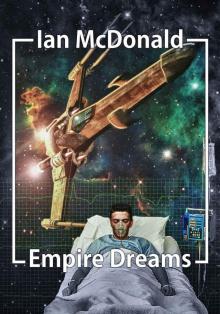 Empire Dreams
Empire Dreams The Menace from Farside
The Menace from Farside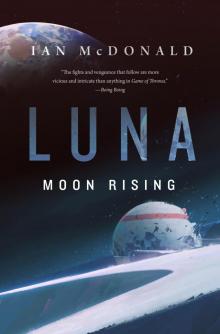 Luna: Moon Rising
Luna: Moon Rising Moon Rising
Moon Rising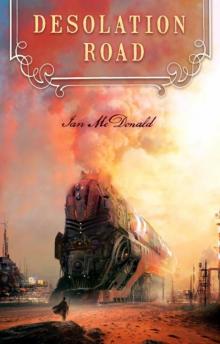 Desolation Road dru-1
Desolation Road dru-1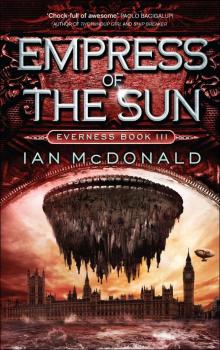 Empress of the Sun
Empress of the Sun Ares Express dru-2
Ares Express dru-2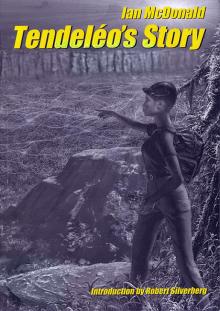 Tendeléo’s Story
Tendeléo’s Story River Of Gods
River Of Gods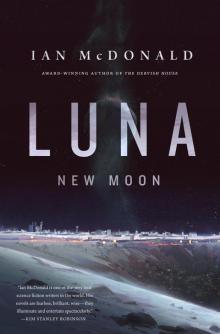 Luna
Luna![Cyberabad Days - [River of Gods 02] Read online](http://i1.bookreadfree.com/i1/03/29/cyberabad_days_-_river_of_gods_02_preview.jpg) Cyberabad Days - [River of Gods 02]
Cyberabad Days - [River of Gods 02]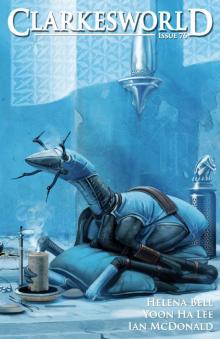 Clarkesworld Magazine Issue 76
Clarkesworld Magazine Issue 76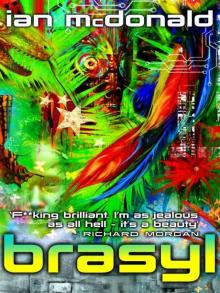 Brasyl (GollanczF.)
Brasyl (GollanczF.)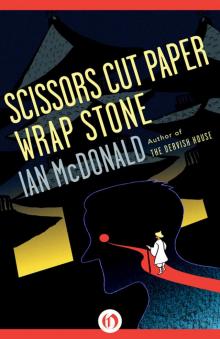 Scissors Cut Paper Wrap Stone
Scissors Cut Paper Wrap Stone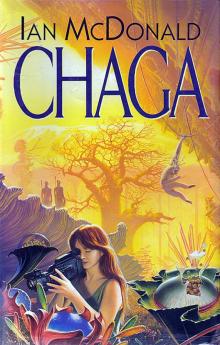 Chaga
Chaga Time Was
Time Was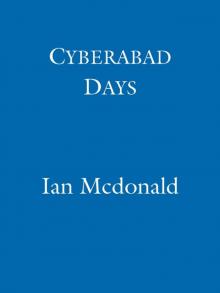 Cyberabad Days
Cyberabad Days Be My Enemy
Be My Enemy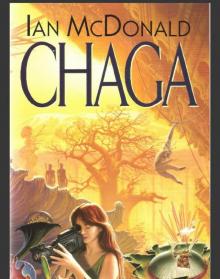 Changa
Changa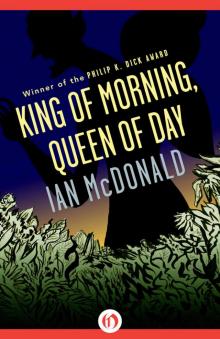 King of Morning, Queen of Day
King of Morning, Queen of Day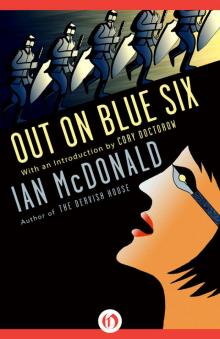 Out on Blue Six
Out on Blue Six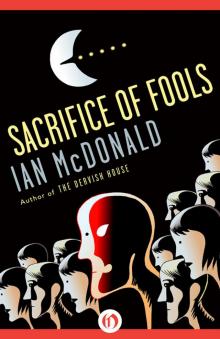 Sacrifice of Fools
Sacrifice of Fools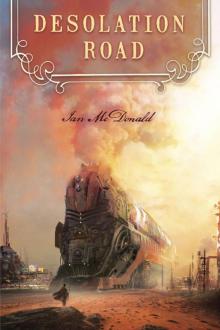 Desolation Road
Desolation Road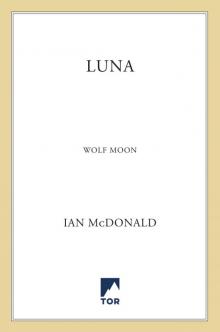 Luna--Wolf Moon--A Novel
Luna--Wolf Moon--A Novel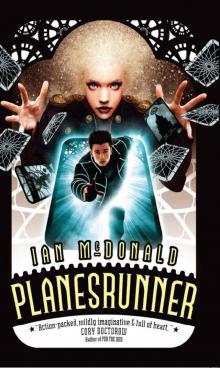 Planesrunner (Everness Book One)
Planesrunner (Everness Book One) Ares Express
Ares Express